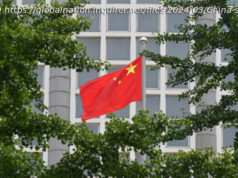Trade with China has security implications that need intelligent handling.
Leaders from Washington to Brussels are increasingly troubled by the flood of Chinese money seeking acquisitions abroad, and asking themselves how best to respond. The answer is: more carefully.
The U. S. has a federal panel, created more than four decades ago, that scrutinizes foreign investments for national-security implications, but it isn’t adequate to the task. The European Union’s current arrangements are even less satisfactory: Many EU countries have no such safeguards at all. And these failures matter, because no country has ever had to deal with an economic superpower quite like China.
It openly aspires to build up both its military and national champions in industries of the future — partly by acquiring advanced Western technology. It has more money than any other country to apply to this goal: Its companies vastly increased their investments in the U. S. and EU last year, to $46 billion and $42 billion, respectively, and its government maintains close ties even to ostensibly private firms.
As a matter of policy, this push is notably one-sided: Tight restrictions apply to inbound investment, including requirements to share intellectual property. Above all, unlike previous rising economic powers, China is neither an ally nor a democracy: It hopes to rival the U. S. militarily in Asia and maybe beyond .
As a Department of Defense report pointed out earlier this year, the U. S. panel — the Committee on Foreign Investment in the United States, or CFIUS — has a mandate designed for another era. The committee doesn’t review overseas joint ventures, some early-stage investments or other arrangements that could involve the transfer of sensitive technologies. The number of cases that do come before the committee is surging, yet key positions remain unfilled. The EU has only just begun to consider a framework for screening foreign investments.
Meanwhile, the range of security concerns is growing. Many advanced civilian technologies now lend themselves to military application. Even companies with no apparent connection to security issues — such as MoneyGram International Inc., a Texas-based remittances firm that’s looking to sell itself to Ant Financial, the fintech company founded by Alibaba’s Jack Ma — may control a wealth of customer information that could be of great interest to Chinese spy agencies.
To be sure, Western governments shouldn’t overreact — as happened when Japan launched its own buyout spree in the 1980s. Contrary to what some in Congress seem to think, the U. S. doesn’t need protecting from a Chinese takeover of U. S. farms, or of landmark buildings and Hollywood studios .
But regulators do need to broaden their scrutiny so that it more fully embraces sensitive technologies, cybersecurity and big data. CFIUS should look at licensing and other agreements that implicate those concerns, regardless of whether they result in a change of corporate control. Mitigation agreements — the conditions that have to be followed for the deals to go ahead — should be toughened and made easier to enforce.
The EU needs a similar mechanism, with a similarly broad purview. And as far as possible, Europe, the U. S. and their NATO allies should coordinate their efforts.
This broader approach won’t please Beijing — but it needn’t be a cause for alarm, and it shouldn’t be seen as a provocation. China agrees that countries have a right to consider security in scrutinizing foreign investments. It will be crucial, though, to prevent broader scrutiny from collapsing into plain old protectionism. The U. S. and Europe need to affirm their support for international investment in general, confining their oversight to arrangements that arouse genuine security concerns.
And China should do the same — not least by agreeing to open its own economy to inward investment and helping to revive talks, which have lately stalled, on a range of bilateral investment treaties. Two-way flows of investment that facilitate competition and commerce are win-win. Efforts to attend more carefully to security concerns are needed — but that vital truth should never be obscured.
–Editors: Nisid Hajari, Clive Crook.
To contact the senior editor responsible for Bloomberg View’s editorials: David Shipley at
davidshipley@bloomberg.net
.






